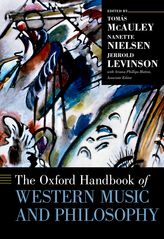Oxford Handbook of Western Music and Philosophy
Naomi Waltham-Smith has written the chapter on “Deconstruction” and translated an essay by Jean-Luc Nancy on “Galant Music” for the new Oxford Handbook of Western Music and Philosophy, edited by Tomás McAuley, Nanette Nielsen, and Jerrold Levinson.
https://www.oxfordhandbooks.com/view/10.1093/oxfordhb/9780199367313.001.0001/oxfordhb-9780199367313
Naomi Waltham-Smith, “Deconstruction”
This essay explores the complex, yet intimate relation between music and philosophy, arguing that this opposition has always already gone into deconstruction. If the tradition of Western philosophy from Plato to contemporary Continental thought has founded itself through the exclusion of music as its other, this essay explores how philosophy might let music be in its singularity without appropriating it and reducing it to the order of the concept. It focuses in particular on the approaches to music and listening found in the thought of Jacques Derrida, Jean-Luc Nancy, and Giorgio Agamben, locating music at the thresholds between sound and sense and between sensation and signification.
Jean-Luc Nancy, “Galant Music,” with a translator’s introduction by Naomi Waltham-Smith
Philosopher Jean-Luc Nancy advances a provocative thesis: namely, that the term galant be generalized beyond its traditional historical limits to characterize music’s relationship to sense and to freedom more broadly. Nancy uses the notion of musical galanterie, with its connotations of charm, elegance, finesse, and also ornamentation, and bravura, to reprise and develop some of the issues he has raised in previous texts about sense and sensation, such as Listening and Corpus. Specifically this idea of music as galanterie allows Nancy to reconfigure music’s distinctive relationship to signification and redefine the nature of its much-vaunted autonomy. Arguing that music is an “art of passage” and the approach of the impossible, the text makes striking use of the metaphorics of touch and tact and the translator’s introduction argues that all of Derrida’s suspicions in On Touching—Jean-Luc Nancy about the limits of Nancy’s deconstruction of touch should also be brought to bear on the problematic at stake here, including on the possibility of traversing unbridgeable idioms.

